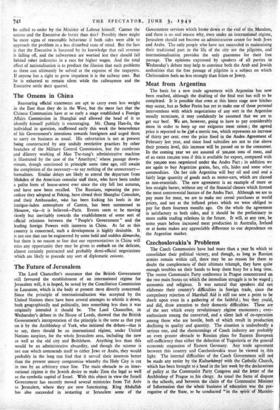The Future of Jerusalem
The Lord Chancellor's assurance that the British Government still favoured the establishment of an international regime for Jerusalem will, it is hoped, be noted by the Conciliation Commission in Lausanne, which is the body at present most directly concerned. Since the principle of internationalisation was accepted by the United Nations there have been several attempts to whittle it down, both geographically and politically, into something less than it was originally intended it should be. The Lord Chancellor, in Wednesday's debate in the House of Lords, showed that the British Government's interpretation of the principle is the same as that put on it by the Archbishop of York, who initiated the debate—that is to say, there should be an international regime, under United Nations auspices, for the whole Jerusalem area, including the new as well as the old city and Bethlehem. Anything less than this would be an administrative absurdity, and though the scneme is not one which commends itself to either Jews or Arabs, they would probably in the long run find that it served their interests better than the present uneasy compromise whereby the Holy City is cut in two by an arbitrary truce line. The main obstacle to an inter- national regime is the Jewish desire to make Zion the legal as well as the symbolic capital of Israel. With this object in view the Israeli Government has recently moved several ministries from Tel Aviv to Jerusalem, where they are now functioning. King Abdullah has also succeeded in restarting at Jerusalem some of the Government services which broke down at the end of the Mandate, and there is no real reason why, even under an international regime, Jerusalem should not become an administrative centre for both Jews and Arabs. The only people who have not succeeded in maintaining their traditional part in the life of the city are the pilgrims, and internationalisation provides the only guarantee for their free passage. The opinions expressed by speakers of all parties in Wednesday's debate may help to convince both the Arab and Jewish authorities that the free passage of pilgrims is a subject on which Christendom feels no less strongly than Islam or Jewry.


































 Previous page
Previous page